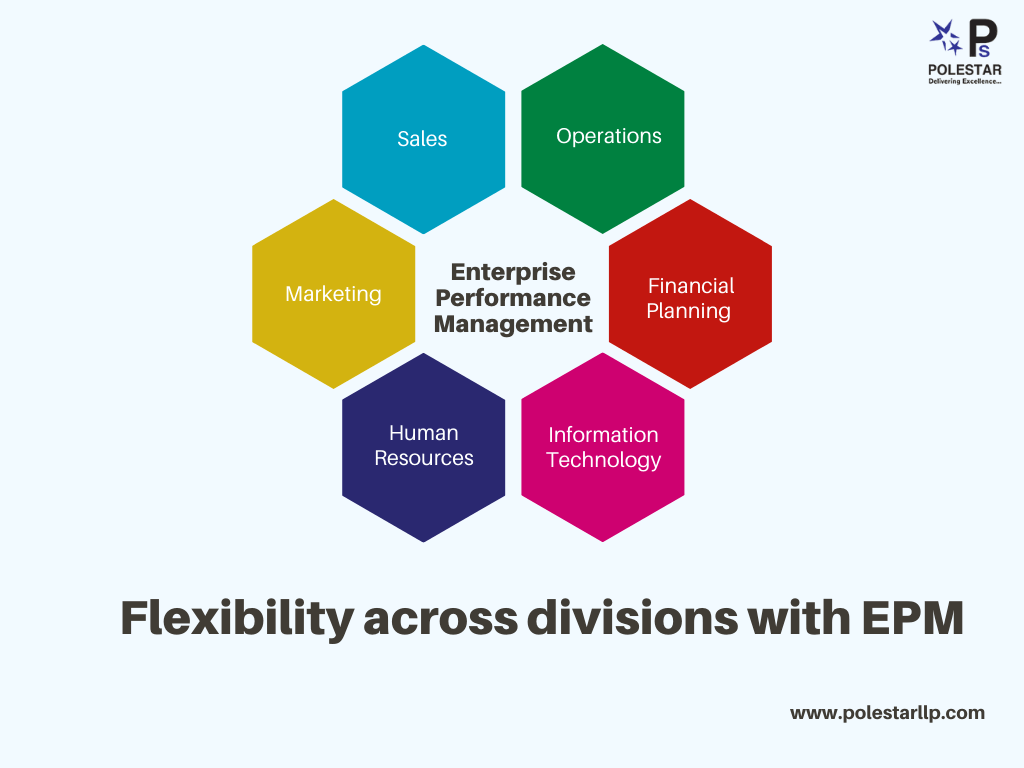Most organizations feel that- “Data is no longer the new oil but, it is the new water.” With all the different departments like Sales, Marketing, Finance, HR etc. are focusing on the collection and usage of data. With the presence of multiple ERP- Enterprise Resource Planning across the various divisions which focus on specific outcomes, the need for flexible systems and EPM- Enterprise Performance to manage organizations in a broader, enterprise-wide improvement is increasing.
The objective of performance measurement has changed over the past few decades. Traditional performance measures based on finances or productivity are no longer appropriate in today’s competitive global market. This gap can be reduced by using EPM tools. Enterprise performance management aims at providing actionable decision-making information above any data source. It is a process supported across planning, reporting, and business intelligence software that allows an enterprise to connect its strategy with execution and planning.
Enterprise Performance Management (EPM) is also known with other names like Corporate Performance Management (CPM), Business Performance Management (BPM), and Financial Planning & Analysis (FP&A).
3 Key Components Of Enterprise Performance Management (EPM)
Gartner defines Enterprise Performance Management or EPM as the process of monitoring performance across the enterprise with the goal of improving business performance. EPM is an umbrella term that represents the methodologies, metrics, processes, and systems used to manage and monitor the business performance of an enterprise.
In the present scenario, EPM Solutions are critical for managing all types of organizational activities by linking operational and financial metrics to insights. With robust EPM practices, managers can drive better performance across the organization by monitoring operational and financial results against forecasts and defined goals.
The three significant components of EPM are -
- Planning
- Forecasting
- Budgeting
Or commonly known as PFB, it encompasses the ability to monitor performance measures (KPIs). Enterprise Performance Management solutions also encompass the financial close, consolidation, and report process. Ultimately, these suites of solutions are to support the business by linking the strategic plan with the annual budget and the periodic forecast using both bottom-up and a top-down methodology.
Why Flexibility Matters In EPM?
Enterprise Performance Management is the chief enabler in achieving your strategic & commercial goals and objectives. EPM is important to manage your business and analyze, understand and report on the business activities. In a business, there would be various core and support activities including Operations, Sales and Marketing, HR, Workforce Management, IT, and Support, which need collaboration, connectivity, and flexibility to work with.
Gain insight into revenue and operations and manage planning across the organization with collaboration with Enterprise Performance Management
The core perspective of EPM is achieving a lean and more flexible enterprise. It is not enough to implement any performance improvement program. What is needed is an effective and efficient way to achieve continuous improvement through the skillful use of performance measures, measurement systems, and software tools. Right now, the most crucial attribute of enterprise performance management is flexibility, and one must know why flexibility is important.

Reasons Why Flexibility Is Key For EPM Framework:
1. The flexible modeling platform allows businesses to start with a baseline model for budgeting, reporting, and forecasting. And as your business grows to more complexity, you can simplify it by automating the complex processes into a streamlined and intuitive process within the web interfaces.
2. Both small and large enterprises can take advantage of the flexibility. Small businesses can leverage the pre-built apps to get started in a flick. However, mid-size to big-shot enterprises can use Business Intelligence (BI) modeler tools to get prompt solutions.
3. Moving collaboration within a planning platform allows users to refine their assumptions and act on outputs more quickly.
4. There is a wide array of use cases across the enterprise, with opportunities to connect marketing campaigns, workforce planning, IT costs, sales compensation, project planning, and more.
5. Today’s planning, and forecasting is augmented with real-time insights and predictive analytics. Progressive technology can do more work with its predictive algorithms and simulations, giving teams more time to focus on the add-on work.
6. “Flexible modeling is the King” The Flexibility of EPM acknowledges differentiators and provides competitive advantages, such as the reduction in IT dependence, the robustness and Flexibility of modeling, and management reporting capabilities.
Bottom Line
In today’s fast-paced world, organizational leaders need valuable insight and flexibility in their planning platform to evaluate scenarios and best courses of action in a prompt way. The concept of flexibility becomes crucial in response to radical changes taking place in the business. So, this modern enterprise performance platform needs to be cloud-based with advanced yet user-friendly modeling that can support a variety of cross-functional and complex business use cases. To achieve immense success, one needs to adopt the next-gen approach to enterprise planning.
Learn how Cashflow Management Solution enables agile & resilient business planning by channelling all your data, lying across departments.



